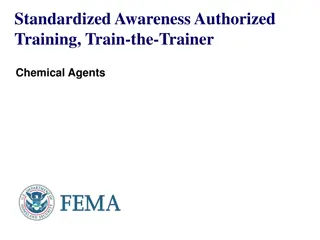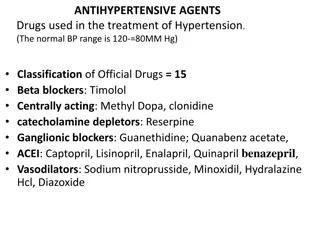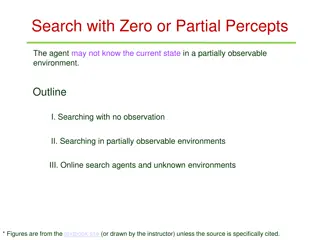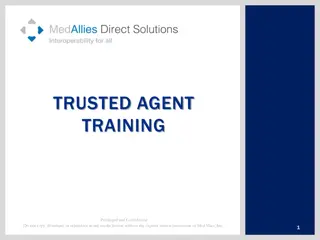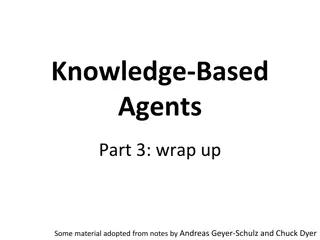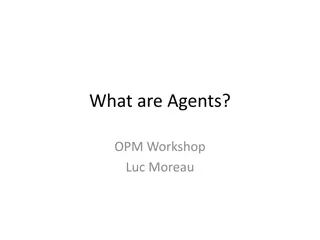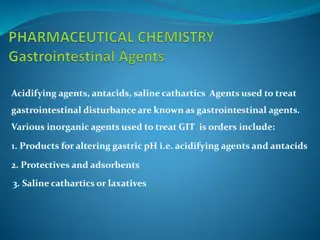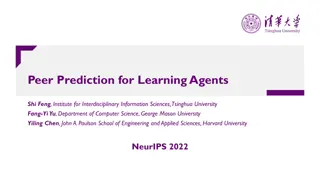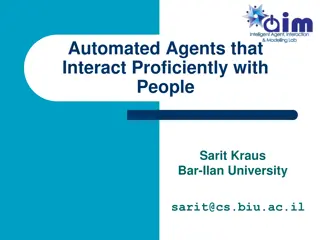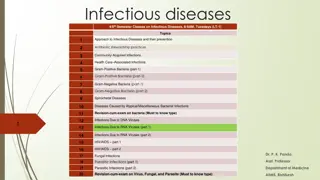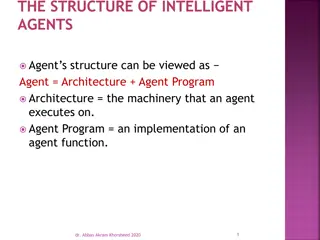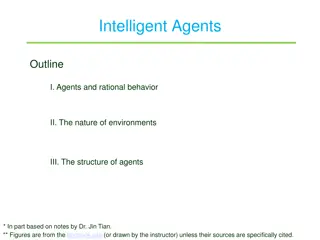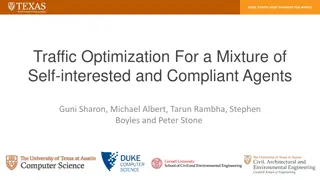Challenges in AI Agents
The common problems faced by AI agents such as lack of memory, unrealistic stories, and inability to proactively find users. Discover how to engage AI agents effectively and address major challenges like multi-modality and cost evaluation.
2 views • 18 slides
Transition Metals Organometallic Compounds Overview
Transition metals bonded with organometallic compounds like metal alkyls, aryls, and hydrides are common in chemistry. Ligands are crucial for stabilizing these complexes, with carbon-based ligands exhibiting diverse binding modes based on the metal's hybridization state. Preparation methods for tra
1 views • 25 slides
Understanding Adrenergic Agents in Pharmaceutical Chemistry
Adrenergic agents play a crucial role in pharmacology by influencing the sympathetic nervous system through adrenergic receptors. These agents, such as sympathomimetics and sympatholytics, impact essential functions like cardiac activity, blood vessel dilation, and insulin release. Adrenergic neurot
0 views • 120 slides
Roles and Responsibilities in Political Party Campaigning and Advertising
Roles and responsibilities in political party campaigning and advertising involve tasks such as soliciting contributions, coordinating fundraising activities, arranging financing, ensuring compliance with electoral budgets and spending limits, managing election expenses, maintaining accounting syste
2 views • 49 slides
Chemical Agents Awareness Training Overview
This training module covers standardized awareness and authorized training on chemical agents, including toxic industrial chemicals, riot control agents, and chemical warfare agents. Participants will learn about the physiological signs/symptoms, advantages/disadvantages of using chemical agents for
1 views • 20 slides
Overview of Antihypertensive Agents and their Mechanisms of Action
Explore the classification of antihypertensive agents used in treating hypertension, including beta blockers, centrally acting agents, ganglionic blockers, ACE inhibitors, vasodilators, and more. Learn about the Renin-Angiotensin System, ACE inhibitors, and specific drugs like Captopril and Benazepr
0 views • 9 slides
Exploring Logical Agents and Architectures in Wumpus World
Explore the use of logical agents in the Wumpus World domain through three agent architectures: reflex agents, model-based agents, and goal-based agents. Understand how these agents operate in the challenging environment of the Wumpus World, where the task is to find the gold, return to starting pos
0 views • 21 slides
Understanding Film Forming Agents for Tablet Coating in Pharmaceuticals
Film forming agents play a crucial role in tablet coating, providing mechanical strength and desired film characteristics. Non-enteric film formers like HPMC, MHEC, EC, HPC, Povidone, SCMC, and PG Acrylate Polymers are commonly used for uniform film formation. Each agent has unique properties and pr
1 views • 10 slides
Selection and Appointment of Foreign Sales Agents: A Comprehensive Guide
Learn about the process of selecting and appointing foreign sales agents in international marketing, including the meaning of agency, content of foreign sales agency contracts, reasons for appointing agents, factors influencing agent selection, as well as the advantages and disadvantages of working
1 views • 12 slides
Understanding Intelligent Agents in Artificial Intelligence
Intelligent agents in artificial intelligence act rationally to achieve the best outcomes in various environments. They operate autonomously, perceive their surroundings, adapt to changes, and pursue goals efficiently. Developing intelligent agents involves examining agents, environments, and their
1 views • 22 slides
Understanding Antineoplastic Agents in Pharmaceutical Chemistry
Antineoplastic agents, such as alkylating agents, target DNA or DNA replication to induce apoptosis in cancer cells. Alkylation of DNA can lead to cell death through various mechanisms, including p53 activation. Resistance to alkylating agents can develop in cancer cells. The process involves nucleo
1 views • 94 slides
Understanding Foliar Nutrition: Droplet Size and Wetting Agents
Foliar nutrition focuses on the effective entry of nutrients into plants through foliar applications. Key factors include droplet size for optimal absorption, the role of wetting agents in nutrient entry, and the importance of fertilizer materials with high solubility and purity. Smaller droplets en
0 views • 8 slides
Understanding Adjuvants and Herbicide Formulation
Adjuvants are additives that enhance herbicide effectiveness, crucial for optimal weed control. Types include surfactants, stabilizing agents, coupling agents, humectants, deposit builders, and more. Surfactants aid in wetting and spreading herbicides, stabilizing agents keep suspensions intact, cou
0 views • 10 slides
Understanding Azole Antifungal Agents for Veterinary Use
Azole antifungal agents play a crucial role in treating fungal infections in veterinary medicine. Imidazoles like clotrimazole and triazoles like fluconazole are commonly used for their fungistatic properties. These agents inhibit fungal enzymes, disrupting membrane fluidity and inhibiting cell repl
1 views • 14 slides
Important Changes for Marketplace Agents in the 2024 Final Rule
The 2024 Marketplace Final Rule brings significant changes affecting Marketplace agents. Agents must document consumer consent and confirmation of application details. Also, a longer HHS review period for agent rebuttals is introduced. Navigators and other assisters now have the option to enroll con
2 views • 8 slides
Understanding the Role and Importance of Diplomatic Agents
Dive into the world of diplomatic agents, exploring their history, classification, immunities, and privileges. Learn about the Vienna Convention on Diplomatic Relations, theories governing diplomatic relations, and the critical role these agents play in modern international affairs.
0 views • 17 slides
Understanding the Impact of the Tenants Fee Ban on Landlords and Agents
The Tenants Fees Act bans all fees from letting agents and landlords to tenants, impacting the rental market significantly. This article explores what can be charged to tenants, reasons for using an agent, services provided by agents, and insights from landlords on the changing landscape post-ban. A
0 views • 13 slides
Understanding Agency Relationships in Business
Agency relationships in business involve principals appointing agents to act on their behalf. There are different types of agents, such as general agents, special agents, factors, brokers, del credere agents, confirming houses, and commercial agents. Each type of agent has specific roles and respons
0 views • 18 slides
Understanding Drug Analysis and Classification
Drug analysis is crucial in identifying and defining substances used for treatment. The definition, characteristics, and classification of drugs are outlined, including chemotherapeutic agents and pharmacodynamic agents. An ideal drug should be localized, non-toxic, efficient, and have minimal side
0 views • 19 slides
Revolutionizing Virtual Agent Management with The Dialer Console
Explore a new way to manage virtual agents with The Dialer Console. From starting and stopping campaigns to making dynamic changes to scripts and agents, this innovative tool provides comprehensive control and flexibility. Dive into managing campaigns, controlling agents, changing scripts, and more
1 views • 11 slides
Understanding Intelligent Agents in Chapter 2
This chapter delves into the concept of agents and environments in the realm of intelligent systems. It explores the types of agents, their functions, and interactions with environments. Rationality, performance measures, and the essence of being a rational agent are key aspects discussed. The vacuu
0 views • 28 slides
Enhancing Mobile-Cloud Computing with Autonomous Agents Framework
Autonomous Agents-based Mobile-Cloud Computing (MCC) refers to moving computing tasks to powerful centralized platforms in the cloud, offering advantages like extending battery life and dynamic resource provisioning. However, an inflexible split of computation between mobile and cloud platforms lead
0 views • 22 slides
Zero or Partial Percepts in Search
In the context of search with zero or partial percepts, agents may not have complete information about the current state in a partially observable environment. This article outlines the challenges of searching in such scenarios, including situations where agents have no observations or only partial
0 views • 20 slides
2013 Membership Development Award: Young Agents Committee Success Story
The Young Agents Committee of the Independent Insurance Agents of Georgia, Inc., won the 2013 Membership Development Award for their outstanding recruitment and retention efforts. Their theme focused on perpetuation, increasing active membership by 36%. Through grassroots development, live registrat
0 views • 10 slides
Trusted Agent Training Overview
This overview provides information on the Trusted Agent Training program, including the target audience, learning objectives, agenda topics, and the role of Trusted Agents in identity proofing within the healthcare industry. Trusted Agents play a crucial role in verifying provider identities for sec
0 views • 55 slides
Understanding Leavening Agents in Baking
This content delves into the importance of leavening agents in baked goods, discussing natural leavening agents, the chemical processes of baking soda and baking powder, the role of yeast leavening, and the differences between quick breads and other baked products. It also covers the leavening agent
0 views • 9 slides
Understanding Knowledge-Based Agents: Inference, Soundness, and Completeness
Inference, soundness, and completeness are crucial concepts in knowledge-based agents. First-order logic allows for expressive statements and has sound and complete inference procedures. Soundness ensures derived sentences are true, while completeness guarantees all entailed sentences are derived. A
0 views • 6 slides
Understanding Agents in OPM Workshop by Luc Moreau
Delve into the concept of agents in OPM Workshop facilitated by Luc Moreau. Explore the nature of agents, their differences from artifacts, causes of their behavior, and challenges in their utilization. Discover the role of enactors, executables, and workflows in generating and controlling agents. U
0 views • 5 slides
Understanding Gastrointestinal Agents: Acidifying Agents, Antacids, Saline Cathartics
Gastrointestinal agents such as acidifying agents, antacids, and saline cathartics are used to manage gastrointestinal disturbances. Acidifying agents like Hydrochloric Acid aid in gastric digestion, while antacids help reduce gastric acidity. Saline cathartics are used as laxatives. Achlorhydria, a
0 views • 36 slides
Overview of Chemotherapeutic and Antimicrobial Drugs and Resistance Mechanisms
Chemotherapy involves using chemical agents to destroy infective agents and inhibit the growth of cancerous cells, while antimicrobials and antibiotics are used to treat various infections. Anticancer agents, antiprotozoals, and anthelminthics are specific types of drugs used for managing diseases.
0 views • 118 slides
Understanding Peer Prediction Mechanisms in Learning Agents
Peer prediction mechanisms play a crucial role in soliciting high-quality information from human agents. This study explores the importance of peer prediction, the mechanisms involved in incentivizing truthful reporting, and the convergence of learning agents to truthful strategies. The Correlated A
0 views • 7 slides
Advancements in Automated Agents for Efficient Interaction with People
Explore the diverse applications of automated agents in various domains such as buyer-seller interactions, cultural studies, conflict resolution, medical applications, sustainability efforts, decision-making support, and training simulations. Discover how these automated agents are revolutionizing p
0 views • 20 slides
Understanding Gastrointestinal Agents and Disorders
Learn about gastrointestinal agents used in the treatment of GIT disorders such as achlorhydria, hyperacidity, diarrhea, and constipation. Explore the classification of gastrointestinal agents including gastric acidifiers, antacids, protectives, adsorbents, and cathartics. Discover the causes and sy
0 views • 45 slides
Understanding Infectious Diseases: Approach, Prevention, and Viral Agents
Infectious diseases play a significant role in public health, with a focus on antibiotic stewardship, community-acquired and healthcare-associated infections, as well as various bacterial, viral, fungal, and parasitic agents. Specific topics include the prevention of infectious diseases, with a deta
0 views • 18 slides
Overview of Intelligent Agents: Structures and Types
The structure of intelligent agents consists of architecture and agent program. Different types of intelligent agents include simple reflex agents, model-based reflex agents, goal-based agents, and utility-based agents. Each type operates based on specific characteristics and methods to make decisio
0 views • 19 slides
Understanding Intelligent Agents: Key Concepts and Rational Behavior
Intelligent agents operate based on perceptions, reasoning, and actions within various environments. Agents function through a sequence of percepts, utilizing programs to interpret their architecture. The Vacuum-Cleaner World serves as an illustrative environment for agent behavior, highlighting the
0 views • 31 slides
Long-Acting Injectable Agents for HIV Prevention Research Overview
Background on the challenges of daily oral PrEP for HIV prevention and the potential of long-acting injectable agents like Rilpivirine (TMC278) in providing an alternative solution. The HPTN-076 study investigates the safety and acceptability of TMC278.LA for HIV pre-exposure prophylaxis. Key questi
0 views • 29 slides
Understanding Alkylating Agents in Oncology: Mechanisms and Pharmacokinetics
Alkylating agents have a long history as anti-cancer drugs, with Mechlorethamine being the first developed in 1942. They react with cells in all phases of the cell cycle, causing DNA alkylation and cross-link formation. Common alkylating agents include Cyclophosphamide, Melphalan, and Temozolomide.
0 views • 75 slides
Traffic Optimization for Self-interested and Compliant Agents
In this study, Guni Sharon, Michael Albert, Tarun Rambha, Stephen Boyles, and Peter Stone explore traffic optimization for a mixture of self-interested and compliant agents. The research delves into routing flows of agents across networks and analyzes equilibrium scenarios. The motivation behind the
0 views • 20 slides
Understanding Antimicrobial Agents and Their Mechanisms of Action
Antimicrobial agents play a crucial role in combating harmful microorganisms. They encompass various categories such as antiseptics, disinfectants, germicides, and bacteriostatic agents. Each category targets different types of microbes and serves specific purposes in maintaining public health stand
0 views • 40 slides




